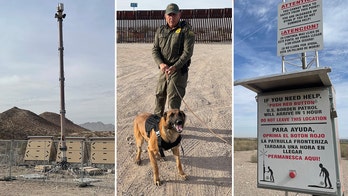What are the 10 military bases named after Confederate generals?
A look at the 10 military bases named after Confederate generals across the US.
After some high-profile generals floated the idea of renaming Army bases named after Confederate generals, President Trump said that his administration would “not even consider” such legislation.
Those comments came after it was learned U.S. Army Secretary Ryan McCarthy will seek bipartisan support to change the names of the 10 Army bases named after confederates after protests against police brutality and racial injustice have given them new spotlight.
An Army spokesperson told Politico that Defense Secretary Mark Esper also supports the decision.
Former CIA Director Gen. David Petraeus penned an opinion piece for The Atlantic saying, “it is time to remove the names of traitors like Benning and Bragg from our country’s most important military bases.”
“The irony of training at bases named for those who took up arms against the United States, and for the right to enslave others, is inescapable to anyone paying attention,” Petraeus wrote.
But President Trump tweeted Wednesday: “These Monumental and very Powerful Bases have become part of a Great American Heritage, and a history of Winning, Victory, and Freedom,” Trump tweeted. “Therefore, my Administration will not even consider the renaming of these Magnificent and Fabled Military Installations. Our history as the Greatest Nation in the World will not be tampered with. Respect our Military!”
Here are the 10 Army bases named after Confederate officers:
Fort Benning, Georgia
Gen. Henry Benning was a secessionist an ardent defender of slavery. Benning presided over Georgia’s secession convention, and even helped write the state’s Ordinance of Secession. When Georgia seceded in 1861, Benning headed to Virginia, where he argued separation from the Union was the only way to preserve slavery.
Benning helped recruit men to form the Seventeenth Georgia Infantry and was chosen as colonel in August 1861 and fought most of his battles in Virginia. He was with his troops in April 1865 when the confederacy surrendered in Appomattox.
Fort Bragg, North Carolina
Gen. Braxton Bragg was unpopular with Confederate troops and known as a poor military tactician, though he was the military adviser to Confederate President Jefferson Davis.
In the words of Petraeus, “Bragg’s inability to cooperate diluted his effectiveness until his resounding defeat at the Battle of Chattanooga, in November 1863, precipitated his resignation from the Confederate army.”
Fort Hood, Texas
Gen. John Bell Hood was a well-regarded field commander during the Peninsula Campaign and the Battle of Bull Run in 1962, but his reputation was marred by defeat leading an Army in the Atlanta Campaign and the Franklin-Nashville Campaign.
Fort Lee, Virginia
Gen. Robert E. Lee was the renowned commander of the Confederate States Army. He commanded the Army of Northern Virginia from 1862 until its surrender in 1865 and earned a reputation as a skilled tactician.
TRUMP SAYS HIS ADMINISTRATION WILL 'NOT EVEN CONSIDER' RENAMING MILITARY BASES AFTER CONFEDERATES
Fort Gordon, Georgia
Lt. Gen. John Brown Gordon was known as one of Lee’s most trusted generals.
Fort Polk, Louisiana
Lt. Gen. Leonidas Polk was a planter and slave owner before the war, but was killed during the Battle of Atlanta. He was also the second cousin of President James K. Polk.
Fort A.P. Hill, Virginia
Gen. Ambrose Powell Hill was killed in action at the Third Battle of Petersburg. He was a career U.S. Army officer who fought in the Mexican-American and Seminole wars before joining the Confederacy.
Fort Pickett, Virginia
Also a career U.S. Army officer before joining the Confederacy, Gen. George Pickett led Pickett’s Charge, a bloody and futile Confederate offensive on the third day of the Battle of Gettysburg. He fled to Canada when the war was over.
Fort Rucker, Alabama
Col. Edmund Rucker joined the Confederate States Army as the Civil War broke out and was the only officer who was not a general with an Army installation bearing his name.
Camp Beauregard, Louisiana
Gen. Pierre Gustave Toutant Beauregard rose to prominence early in the Civil War, and was one of the leaders who convinced Confederate President Davis that the war was lost and needed to end.
CLICK HERE TO GET THE FOX NEWS APP
After the war, Beauregard returned to his home of Louisiana and advocated for black civil rights and black suffrage, leading an ultimately failed movement calling for the integration of schools, public places and transportation.





